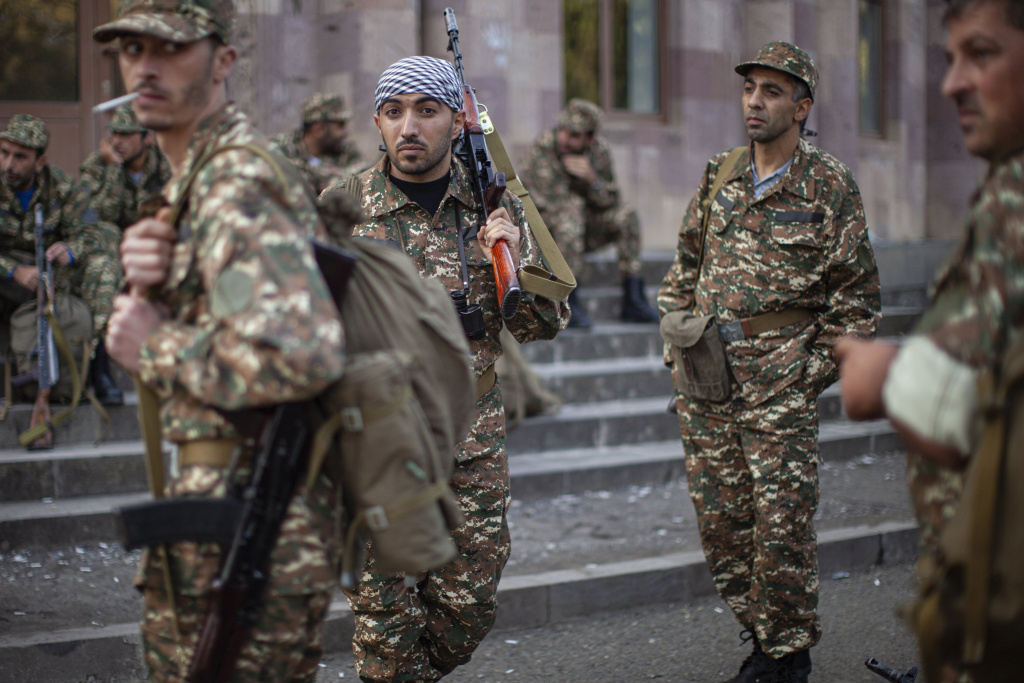France and the Nagorno-Karabakh Conflict: The Role of French Diplomacy
In
Log in if you are already registered
Throughout the years, France has maintained an interest in the South Caucasus, as is reflected by its membership in the OSCE Minsk group, alongside the US and Russia, aiming to help find a solution in the Nagorno-Karabakh conflict. It is thus important to analyze the reasons and objectives behind Paris mediation efforts between Armenia and Azerbaijan, as France is the only EU country that has been a member of OSCE Minsk Group since 1997.

Source: Daily Sabah
France-Armenia and France-Azerbaijan Relations
Understanding France’s relations with Armenia and Azerbaijan is imperative in order to properly understand its role in finding a solution to the conflict. Concerning France and Armenia, friendly relations have been established from the 11th century, as the Armenian Cilician Kingdom was an important place of refuge for the Christian Frank Crusaders at the time. Following the Armenian Genocide by the Ottoman Empire in 1915, an important Armenian population settled in France, forming one of the largest Armenian diasporas abroad (500,000 of today’s French citizens have Armenian origins). Since then, Armenians have become a meaningful part of the French society, giving way to famous national figures such as the singer Charles Aznavour.
In 2001, France recognized the Armenian Genocide. Nowadays, France (after Russia) is the second greatest foreign investor in the country since 2016. Famous companies such as Pernot Ricard (Beverages) and Véolia (Infrastructure) have a presence throughout the country. France and Armenia cooperate in important cultural, scientific and technical projects, even having a key French University located in Yerevan. Finally, Armenia is a member of the French linguistic organization, La Francophonie.
Azerbaijan and France, on the other hand, do not share such a long history. Regardless, the two first presidents of modern Azerbaijan, Heydar Aliyev (1993-2003) and Ilham Aliyev (since 2003) realized their first visit abroad in none other than France. Moreover, a Treaty of Friendship was signed between the two countries in 1993 and France was the second country to recognize Azerbaijan’s Independence, right after Turkey.
Azerbaijan became the first South Caucus economic partner of France in 2020 (even before Armenia). France is also an important foreign investor in the country (7th greatest in 2019).
France also maintains important cultural and scientific networks in Azerbaijan, with the creation of the French Institute in 2011 in Baku, the French-Azerbaijani University in 2016 and over 30 agreements between French and Azerbaijani universities, where cooperation is mainly focused on energy resources and engineering. French energy company Total is present throughout the country and has showed interest in the Absheron Gas Block and the Baku-Tbilisi-Ceyhan pipeline.
Reasons for French Involvement
France has important diplomatic power worldwide (the country has the 3rd largest diplomatic network in the world, after the US and China), is the only nuclear power in the European Union following Brexit, and is the only EU nation that is permanent member in the UN Security Council. Combined, these factors give Paris immense sway in international negotiations regarding Nagorno-Karabakh, especially as the conflict is at the EU’s doorstep, meaning it may escalate and pull in other involved regional powers such as Turkey, Russia and Iran. Additionally, with France’s massive Armenian diaspora, regional economic interests, and long history, it is no surprise to find the country as an essential player in the region.
Additionally, history itself is partly responsible in explaining France’s role in the region, notably with its protection of Armenians and the denunciation of the Armenian genocide.
In this context, it is understandable to question France’s neutrality in the mediation process as it is clear that the vast Armenian diaspora in France has some influence to push for French support towards Armenia or, at least, recurring condemnation of Azerbaijani actions. This support can be seen through the various positions and texts published by the French right-wing party, Les Républicains (LR), favoring Armenia and Armenians living in Nagorno-Karabakh. Indeed, in November 2020, the French Senate (dominated by LR) voted for a resolution to establish sanctions against Azerbaijan, recognize Nagorno-Karabakh as an independent republic and called for the departure of Azerbaijani troops from the disputed territory.
Considering the Armenian diaspora in France, a closer look at the diaspora’s political weight (or in other words, its lobbying activity) is also important in understanding France’s role within the conflict. As there are around 500,000 French-Armenians in France today, their support in any elections is undeniable. Plus, some French-Americans ended up as part of the French elite, such as Edouard Balladur (French Prime Minister during 1993 and 1995). For some, an “Armenian Pressure Group” exists in France which pushed for the “Genocide Law” (against genocide denial) in 2012 and integrating the history of the genocide into French school books, which was supported by both former French presidents Nicolas Sarkozy and François Hollande (Sahilyol, 2012). Thus, France is influenced by the Armenian diaspora and lobbies to intervene in favor of Armenia and an independent Nagorno-Karabakh.
Given the close the bilateral relations between the two countries, France also has gained economic interests in the region. Conflict has a negative impact on economic relations and development as they put risks on investments. Thus, it is in France’s interest to pacify the situation between the two countries and safeguard its economic interests.
France’s Diplomatic Objectives in the Region
While the first and most important goal for France is to arrive at a full resolution to the dispute, other interests must also be considered. While Paris seems to have abandoned the position of obtaining complete independence for Nagorno-Karabakh following the Azerbaijani victory in 2020 and Baku’s control of the disputed region, France still aims to protect the rights of the Armenian population in the Nagorno-Karabakh, especially considering the immense humanitarian problems from the Azerbaijani Lachin corridor blockade.
Another one of France’s objectives is to protect Europe’s energy supply (along with its own). Since the beginning the Ukrainian Conflict (and to some degree even before), the EU sought out alternative energy routes to replace Russian imports, with Azerbaijan being one of their key solutions. This means that a pacified South Caucasus would benefit the energy corridor that supplies Europe, guaranteeing energy stability. Hence, France, as the only EU representative in the Minsk group, can defend these energy interests for the whole Union, in addition to its own (justified by the involvement of French company Total in Azerbaijani energy projects). As stated earlier, a peace agreement between Armenia and Azerbaijan could also guarantee and stimulate French investments in the region.
Additionally, France can also assert itself in the Nagorno-Karabakh negotiation process to advocate the EU’s position in the conflict resolution. Nevertheless, considering Armenia’s influence on France’s Foreign Policy, Azerbaijan has advocated to replace France by another EU member, that is more representative of the EU’s position and is more balanced towards Baku (Shiriyev, 2013). Recently, in July 2023, Ilham Aliyev denounced French “neo-colonialism” given that it is pro-Armenian and thus, according to him, is pro-instability in Nagorno-Karabakh.
What surely is not an objective for France, is to expand the EU to the East. For French President Emmanuel Macron, the Union must develop integration among current members and not look for new countries to welcome. Nevertheless, the situation in Ukraine has pushed France to change its position towards a more positive attitude towards Ukraine (and Moldova) candidacies to the EU, however with numerous conditions.
Nonetheless, considering the conditions in which this position was concealed by France, it is not likely to see the country supporting a new EU accession from the South Caucasus, as it would extend the organization beyond the Black Sea, and create even more tensions with Russia. It may also trigger debate over Turkey’s accession (which France opposes due to the power it could lose in EU decision making processes).
Thus, while EU integration is not an objective for France, a pacified region with the help of Paris and the EU would mean greater stability in the EU’s Eastern Neighborhood. It may promote Western interests in Armenia and Azerbaijan and distance the two countries from Western geopolitical adversaries such as Turkey, Russia and Iran.
Bibliography
- Azerbaijani president targets French "neocolonialism". URL: https://eurasianet.org/azerbaijani-president-targets-french-neocolonialism
- Amaro. S. EU signs new gas deal as fears grow over Russian supplies cutoff. URL: https://www.cnbc.com/2022/07/18/eu-gas-deal-with-azerbaijan-as-fears-grow-over-russia-supplies.html
- Basso, Davide. EU enlargement has to follow ‘planned process’, French MP says.: https://www.euractiv.com/section/enlargement-neighbourhood/interview/eu-enlargement-has-to-follow-planned-process-french-mp-says/
- Brunet, R. Diplomacy is for pros, not improvisers': French diplomats strike over reforms, budget cuts.URL: https://www.france24.com/en/france/20220602-diplomacy-is-for-pros-not-improvisers-french-diplomats-strike-over-reforms-budget-cuts
- Cohen. A. Bad News For Russia, As Gas From Azerbaijan Now Flows To Western Europe. URL: https://www.forbes.com/sites/arielcohen/2021/01/06/azeri-gas-reaches-europe-through-the-southern-gas-corridor/.
- Déclaration de Mme Catherine Colonna, ministre de l'Europe et des affaires étrangères, sur les relations entre la France et l'Azerbaïdjan et le conflit entre ce pays et l'Arménie, à Bakou le 27 avril 2023. URL: https://www.vie-publique.fr/discours/289245-27042023-catherine-colonna-france-azebaidjan
- Fouéré, E. Macron’s “Non” to EU enlargement. URL: https://www.ceps.eu/macrons-non-to-eu-enlargement/
- L’appel de la droite LR pour soutenir le Haut-Karabakh. URL: https://www.lefigaro.fr/vox/politique/toute-la-droite-lr-reunie-d-une-seule-voix-pour-soutenir-le-haut-karabakh-20230612
- Ministère de l’Europe et des Affaires étrangères. Relations bilatérales France - Arménie [Электронный ресурс] // France Diplomatie - Ministère de l’Europe et des Affaires étrangères. URL: https://www.diplomatie.gouv.fr/fr/dossiers-pays/armenie/relations-bilaterales/ (дата обращения: 13.07.2023).
- Ministère de l’Europe et des Affaires étrangères. Relations bilatérales France - Azerbaijan [Electronic resource] // France Diplomatie - Ministère de l’Europe et des Affaires étrangères. URL: https://www.diplomatie.gouv.fr/fr/dossiers-pays/azerbaidjan/relations-bilaterales/ (дата обращения: 13.07.2023).
- Nazarian, S. LIENS CULTURELS ENTRE L’ARMÉNIE ET LA FRANCE. Higher School of Economics. [Электронный ресурс] URL: https://lang.hse.ru/mirror/pubs/share/direct/420262507.pdf#page=35 (accessed: (дата обращения: 14.07.2023).
- Nécessité de reconnaître la République du Haut-Karabagh [Электронный ресурс]. URL: https://www.senat.fr/leg/ppr20-145.html (дата обращения: 13.07.2023).
- Portail de l’Organisation Internationale de la Francophonie (OIF) [Электронный ресурс]. URL: https://www.francophonie.org/88-etats-et-gouvernements-125 (дата обращения: 15.07.2023).
- Qiblawi. T. Potatoes are a luxury: Vital supplies dwindle as 'eco-activists' blockade a breakaway region guarded by Russia [Электронный ресурс]. URL: https://www.cnn.com/2023/01/12/europe/armenia-azerbaijan-nagorno-karabakh-lachin-intl/index.html (дата обращения: 18.07.2023).
- Sahilyol, K. 2012. The Armenian lobby in France and the recent developments regarding the probability of adoption of legislation criminalizing the denial of the so-called Armenian Genocide. IKV Brief. Economic Development Fondation. September 2012.
- Tobelem, B. Adhésion de la Turquie à l’Union européenne : où en est-on ? [Электронный ресурс]. URL: https://www.touteleurope.eu/l-ue-dans-le-monde/adhesion-de-la-turquie-a-l-union-europeenne-ou-en-est-on/ (дата обращения: 19.07.2023).
- TotalEnergies TotalEnergies in Azerbaijan [Электронный ресурс]. URL: https://totalenergies.com/azerbaijan (дата обращения: 13.07.2023).
Student at the HSE University (Saint Petersburg), Master’s Degree “Comparative Politics of Eurasia”
Blog: Thomas Vignes's Blog
Rating: 0




